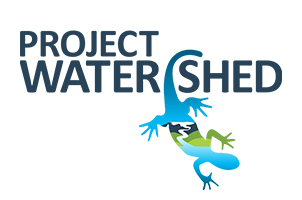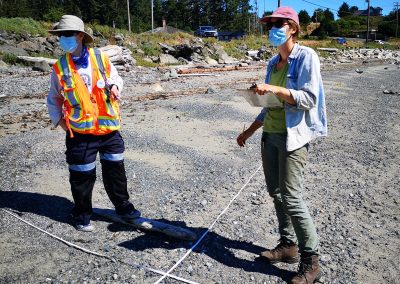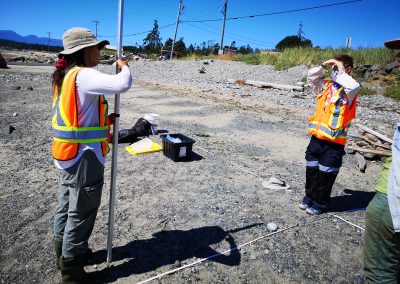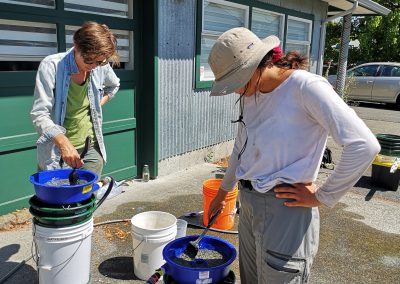Technician Report – Tuesday, November 2nd
Vortexing ~ By Z. Cilliers
Forage fish are an essential prey item in the Pacific Ocean food chain. This group is made up of species such as herring, surf smelt, and Pacific sand lance. Forage fish provide nutrients for salmon species, which in turn support the diets of charismatic ocean mammals like Orcas and sea lions.
Measuring the presence and abundance of forage fish is useful for restoring and protecting habitat that can sustain salmon populations. Surf smelt (SS) and Pacific sand lance (PSL) are beach spawners, meaning they lay their eggs in sediment with a specific size and coarseness. Project Watershed’s Forage Fish Project tests beach sediment for SS and PSL eDNA (environmental DNA) and eggs. This information is used to map forage fish habitat for protection and restoration.
The technician team met Virginia at the beach site and set up two intersecting transects, one down a length of the beach and the other from the water’s edge to the road. Air and water temperatures were taken, weather and tide height were observed, and the date was recorded. Samples of sediment were randomly taken along the lengthwise transect, labelled, and bagged for eDNA lab testing. A sight was then used to measure the slope of the beach every ten meters down the cross transect.
Random samples were also taken along the lengthwise transect for egg detection. This sample was brought back to the lab. The potential eggs were separated by sieving, vortexing (a reverse gold panning method), and viewed under the microscope. This particular group of samples did not contain SS or PSL eggs.
With the help of the Healthy Watersheds Initiative funding Project Watershed has hired environmental technicians to assist with our projects over the summer and early fall. The Healthy Watersheds Initiative is delivered by the Real Estate Foundation of BC and Watersheds BC, with financial support from the Province of British Columbia as part of its $10-billion COVID-19 response. Jamie Lund, one of these technicians, will be posting a brief report every Tuesday to update the Project Watershed community on what they have been up to.
Related Posts
Gwen Janz
Meet our new Forage Fish Lead Biologist!
Eelgrass Update
In the fall our restoration team surveyed the three eelgrass beds which were planted with the help of our volunteers back in June. The beds are looking healthy!
Kus-kus-sum: End of Season Wrap-up
Now that we have put the Kus-kus-sum site to bed for the winter, we wanted to give you all a little update on how things progressed this season – lots happened!
Kate McKeown
Meet our new Forage Fish Technician!
Greenshores at Dyke Road Park – Reimagining a Park
On September 20 and 21, over 20 people were on site to help with planting at the Comox Valley Regional District’s (CVRD) Dyke Road Park redevelopment project.
Gartley Beach Green Shores for Homes Project
Project Watershed is teaming up with the CVRD and the Stewardship Centre for BC to do some shoreline restoration at Gartley Beach in Royston.





